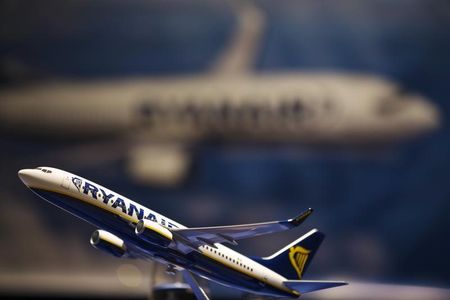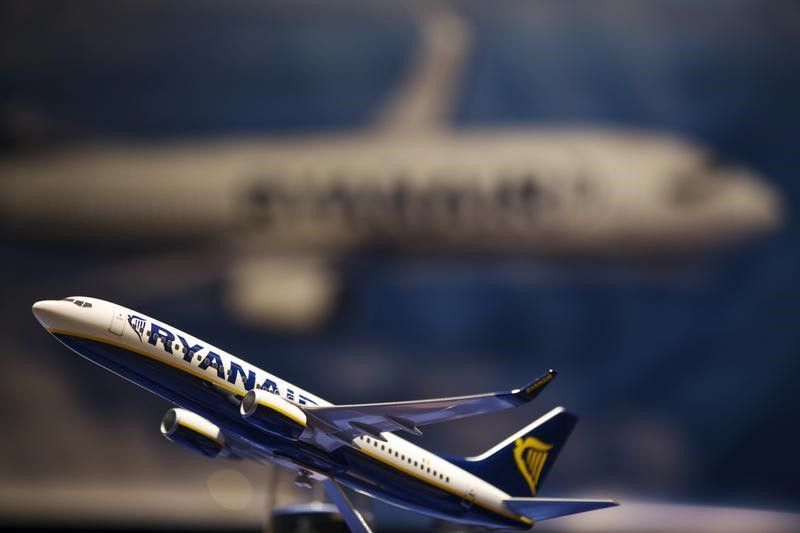By Conor Humphries
DUBLIN (Reuters) - Ryanair's (I:RYA) bid to become one of the world's biggest airlines will focus on higher-frequency routes and more domestic flights in core European markets rather than venturing further afield, its chief commercial officer said in an interview.
Already Europe's largest airline by passenger numbers, selling over 80 million tickets last year, Ryanair is targeting 50 percent growth in passengers by 2019 and has placed orders for 380 new Boeing planes.
Most growth will come from increasing capacity in core European markets like Germany, Poland and the United Kingdom rather than breaking into new markets like the former Soviet Union and Middle East.
"A lot of the growth is going to be relatively unspectacular in appearance, but spectacular in size," said Ryanair's David O'Brien, who is in charge of doing deals with airports to add to the airline's 1,600 routes.
In a bid to woo the lucrative business traveller, who has shunned the airline's traditional hair-shirt offering, Ryanair in recent months has cut fees, allowed extra carry-on luggage and improved its coffee.
The focus over the next year is to give business travellers many more short-haul routes with at least two flights a day and more planes going to capital cities, while the number of domestic routes will increase significantly.
"That is quite boring and low key, but that is where the real opportunity in growth is to come from," O'Brien said.
Ryanair estimates that around 20 million of its 83 million annual passengers are business travellers and aims to increase that number to between 30 million and 36 million.
BEYOND EU
In recent months Ryanair has discussed expanding into several markets beyond the European Union's deregulated Open Skies area, whose establishment in the 1990s set the stage for the spectacular growth of low-cost carriers like Ryanair.
It has bid for Cyprus airlines, to use its routes beyond the European Union and management have floated the idea of routes to Russia and a hub in Israel.
But with five operating planes in Cyprus, it is never going to be a core offering, O'Brien said. Russia, where the airline may start operating next year, would only be two routes to Ireland, unlikely more than three times a week.
Israel has potential, but in the big picture is small, complicated, protectionist and "very, very expensive", O'Brien said.
"All of this would be pressing and a concern if we didn't see there was sufficient opportunity to deploy our capacity within Europe," he said. "They are essentially not material to our growth plans."
'OLD RELIABLES'
Instead, Ryanair intends to focus on "old reliables" like the United Kingdom, Poland, Italy and Germany, specifically on short, high-frequency routes, many of them domestic.
Ryanair, which until recently had almost no domestic routes, has built up an extensive network in Italy and this winter is launching its first three routes in Poland, where flights per head of population are just a quarter of the level in Spain and Ireland.
Germany, where the airline has a market share of just 4 percent behind Lufthansa (DE:LHAG) and Air Berlin (DE:AB1), is certain to see domestic expansion in the next few years, if the government cuts its air passenger duty, which hits domestic passengers on both ends of a flight.
Ryanair recently launched three flights per day from Edinburgh and Glasgow to London, its first new domestic UK routes for four years. It is hoping Scotland will succeed in convincing London to allow it to scrap its passenger duty - a move that Northern Ireland and Wales may seek to match.
The Scottish routes will feed London's Stansted, which has one of the largest short-haul networks in Europe with 170 routes.
Sparse areas of Ryanair's European route map also include Romania and Scandinavia, where rivals Wizz Air and Norwegian (OL:NWC) have expanded aggressively.
Ryanair will this winter increase capacity to Bucharest and "over time" will develop in Romania. It will expand in Scandinavia in the medium term, O'Brien said.
In Turkey, the most attractive market on the European periphery due to its large population and holiday market, entrenched competitors Turkish Airways (IS:THYAO) and Pegasus Airlines (IS:PGSUS) mean the door is effectively closed.
Instead Ryanair will seek to leverage its lower fares to take the easy opportunities where "politics and protectionism" don't get in the way, O'Brien said.
"We are certainly not going to torment ourselves overcoming obstacles when there is lower hanging fruit close to home," O'Brien said.

(This story was refiled to add Glasgow flights)
(Reporting by Conor Humphries; Editing by Elaine Hardcastle)
